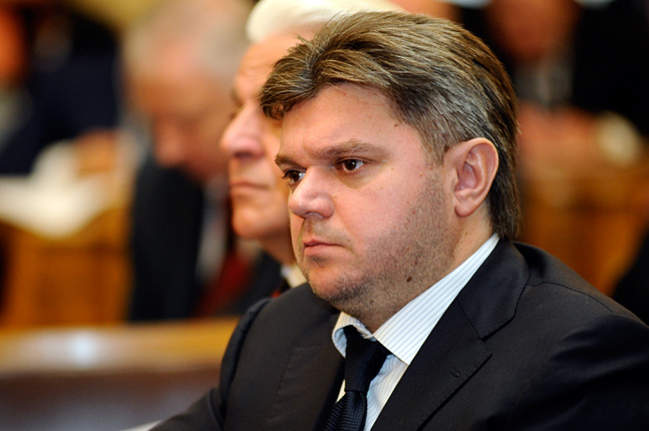
Ukraine Chooses Shell and Chevron to Extract Shale Gas
Publication: Eurasia Daily Monitor Volume: 9 Issue: 97
By:

The Ukrainian government has chosen Shell and Chevron to develop its shale gas fields. Their first drilling results are expected in 2013-2014. Whether or not these results match expectations will be a test for Ukraine’s ability to cut its umbilical cord to Russian gas. Without active assistance from the Ukrainian government, it will be difficult to overcome both the bureaucratic hurdles that lie ahead and the inevitable opposition to the shale gas projects from Russia’s Gazprom. If the projects are successful, Ukraine will attract billions of dollars in foreign investment and significantly diminish its dependence on Gazprom.
The government decided to choose foreign partners to develop shale gas deposits last year, when Russia made it clear that it would not cut the gas price for Ukraine without serious concessions. On April 24, Ukrainian Environment Minister Eduard Stavytsky announced that ExxonMobil, Shell, TNK-BP, Chevron and Eni would compete in two tenders for two shale gas fields. At its meeting on May 10, the government approved the tender commission’s final choice of Chevron and Shell (kmu.gov.ua, May 14). Stavytsky confirmed this at a press conference on May 16. Drilling will start in 2013 and gas extraction will begin by 2015 at the Yuzovske field; the drilling and extraction dates for the Oleske field are 2014 and 2016, respectively (for-ua.com, May 16).
Shell will develop the Yuzovske field in the eastern Ukrainian regions of Kharkiv and Donetsk, while Chevron will develop the Oleske field in the regions of Lviv and Ivano-Frankivsk, which are in western Ukraine near the border with Poland. Yuzovske may contain as much as 2-10 trillion cubic meters of gas (tcm) while Oleske has about 0.8-2.5 tcm, according to different local estimates. The US Energy Information Administration estimates Ukraine’s total shale gas reserves at a more modest 1.2 tcm, which appear to be lower than Poland, France and Norway have.
Stavytsky’s ministry hopes Ukraine will be able to extract 10-15 billion cubic meters (bcm) of gas from the two shale gas fields starting from around 2020, compared to 20 bcm of gas extracted elsewhere in Ukraine and 40 bcm of gas imported from Russia last year. Stavytsky said Shell would invest the equivalent of at least $400 million and Chevron plans to invest $325 million in drilling works at the first stage. The two multinationals will have to work in partnership with local state-controlled companies, Nadra Yuzovska and Nadra Oleska, which have been established specifically for the two projects. Shell and Chevron will have to negotiate their partners’ shares in production sharing agreements (PSAs) by September (Biznes, May 21). If the PSAs are concluded and findings in the fields match expectations, some $30-$50 billion will be invested in Yuzovske and $20 billion in Oleske within 30 years, Stavytsky predicted (Ekonomicheskie Izvestia, May 18). This would be the largest foreign investment in Ukraine’s energy sector ever.
Along with developing shale gas, the government says it will triple gas extraction in the Black Sea to 3 bcm by 2015 and start processing some 10 bcm of liquefied natural gas per annum from either Azerbaijan or Qatar at a new terminal to be built near Odessa by 2016. This will allow Ukraine to significantly reduce its gas imports from Russia. Ukrainian President Viktor Yanukovych said in a recent interview that Ukraine could not afford the current Russian gas price, so it would continue cutting imports from Russia from 40 bcm last year to 27 bcm this year and further in 2013, while increasing domestic gas extraction and looking for alternative suppliers (UT-1, May 20). He spoke after fruitless talks with Russia’s newly elected President Vladimir Putin on May 15. However, Yanukovych said in Moscow that if Russia cut its gas price for Ukraine, there would be no need to look for alternative suppliers (UNIAN, May 15). This raises doubts about Kyiv’s determination to diminish its dependence on Russian gas. If all the recent ambitious Ukrainian gas projects are nothing but bargaining chips for the talks with Moscow, Western investors in Ukrainian shale gas are in for a bitter disappointment.
Even if Shell’s and Chevron’s talks with the government-selected local partners on PSAs are successful, the success of the projects is not guaranteed if the government changes after the 2015 presidential election. When Yulia Tymoshenko became Prime Minister for a second time in 2007, she decided to annul a project to extract gas in the Black Sea with the participation of the Texas company Vanco, which had won a government tender conducted under her predecessor and bitter rival Yanukovych. Vanco’s local partners had been reportedly linked to the Yanukovych camp. Moreover, Kyiv has apparently, intentionally or not, planted a time bomb under at least the Oleske project. The Lviv Region council has protested the results of the tender won by Chevron, saying that its representatives had not been invited to sit in on the tender commission. Due to this, the results must be proclaimed null and void, according to the council, which is dominated by Yanukovych’s opponents from the far-right party Freedom (Ekonomicheskie Izvestia, May 18). According to Ukrainian law, PSAs must be agreed with local councils, so Chevron may face problems in Lviv even before it starts drilling.




